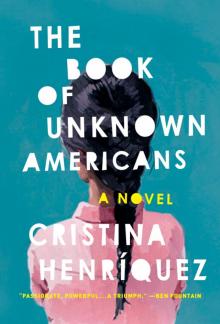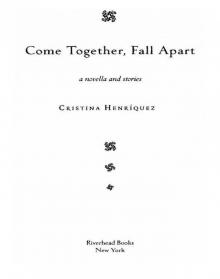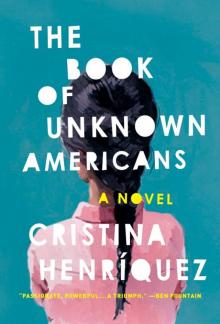- Home
- Cristina Henriquez
Come Together, Fall Apart Page 7
Come Together, Fall Apart Read online
Page 7
“No, thank you.”
“I”—her grandmother makes a squeezing motion with her hands—“to it myself.”
“You squeezed it yourself?”
Her grandmother grins and nods.
“Maybe later,” Maria says.
“You want piña?”
Her grandmother lifts an overturned plastic bowl from a plate to reveal a perfect wheel of sliced pineapple awaiting her.
“Okay,” Maria says.
“Piña, piña, piña, piña!” her grandmother sings as she brings the plate to the table. When she places it in front of Maria, she points and says, “Pine-app-hol, no?”
Maria smiles. “Pineapple. Sí.” She can tell, by the way her grandmother tries her best with English, that she’s still not entirely sure whether Maria can understand Spanish. After all, the last time Maria was there, she had known a total of about five words in Spanish. But since then she’s been studying it in school with Senora Graham, who insists on addressing her students in Spanish even in the hallways. Her friends thought Maria had an advantage, since her mother spoke Spanish. A boy who sat behind her—his Spanish-class name was Taco—even hissed at her once that he bet she secretly knew Spanish and was only pretending she didn’t. Maria had wanted to tell him, No, my mother never spoke Spanish when I was little because she wanted me to be American, but she stayed quiet. At some point, Maria knows, her mother realized she had made a mistake in not passing on her language to her daughter. As soon as the classes were available, her mother called the guidance counselor to make sure they were on Maria’s schedule. Maria would have signed up, anyway. And now she was doing well.
Her grandmother goes back to the stove to check the sancocho. She ladles some broth and lets it slide into a small bowl on the counter. “So that your grandfather eats something,” she says, almost to herself After she has collected enough broth, she replaces the lid on the cast-iron pot and turns down the gas.
“What will you do today?” her grandmother asks.
Maria answers, in Spanish, that she doesn’t know. It’s August. If she were home, she would be sleeping, or calling a friend, or eating Cheetos in front of the television. But she ended up here for the remainder of her summer vacation, because it was her mother’s idea and because she wanted to come. The only people she knows here, though, are her grandparents. She is used to coming here with her parents, who always take her shopping or to the beach or to the restaurants by the canal or to the fruit markets. She is not used to figuring out for herself what to do here all day.
When Maria was younger her grandfather went with them to the ocean. He used to have a house there, overlooking the water. The house was painted bright yellow, with a wavy red roof. There were so many windows that even when you were inside, it never felt like you were. It felt, the whole time, like you were sleeping and breathing and eating with the chickens and the dogs and the beetles and the cockroaches. And then there really was being in the open air: Hammocks hung all around the house, tied up at the posts that supported the overhang in the roof, and tied up between palm trees. Maria and her grandfather used to rest in them—when she was still very small, they shared one and, when she got older, they each had their own—and gaze at the sea. Black silk, he would say, on the nights when the moon was new. Liquid mercury, when the moon was waning or waxing. A layer of butter melting in a frying pan, when the moon was full. Descriptions Maria gathered from her mother. This is what he’s saying, Maria. This is what he’s saying. They never spoke directly. And to Maria it felt like standing on opposite ends of a rickety bridge with her mother in the middle, bravely holding everything together, reaching out her arms in either direction, coaxing them both to come, but neither Maria nor her grandfather could comprehend how to walk to the other side.
Maria’s grandfather sold that house years ago, though, because her grandparents needed the money. After that, her grandfather started calling her Mar, short for Maria, but it also meant ocean, she knew. He was trying to hold on to her and those days in the hammocks, he was trying to hold on to the house, he was trying to hold on to the ocean, but those things were gone. They had slipped through his fingers like the warm salt water itself.
Maria’s parents are getting divorced. It came on, like a sickness you just can’t shake, earlier this summer. Of course, it was probably even earlier than that, but the first time Maria remembers knowing it for sure was at the beginning of this summer.
They drove from their house in New Jersey up to Boston. Maria hadn’t yet found a summer job and her father, wanting to take advantage of this rare opening in his teenage daughter’s life, planned a trip to Boston. He surprised Maria and her mother with the news at the dinner table. As soon as he made the announcement, Maria’s mother, an attorney, said something about a case she was working on that couldn’t be abandoned. “It can,” her father said, simply, firmly, and then looked to Maria for any objections. There was supposed to be a party at Dan Cavallano’s house that weekend, but Maria didn’t bring it up. A party was not important to her father at that moment, she could tell, and she wasn’t positive she was invited, anyway. When she didn’t offer anything, her father, his eyes crinkling at the corners, smiled and said they were really going to love the hotel he had set them up in.
In the car, her father played all his Chicago and America tapes.
“Only bands with geographical names!” he had shouted happily as they pulled out of the driveway. Her mother sat with her silver cell phone folded on her lap, staring out the window. In the back seat, Maria took her shoes off and put on headphones.
At the first rest stop, her father went for TCBY. Maria went to the bathroom and then came back outside to flip through her CD binder. Her mother was leaning against the car, squinting into the sun. If the backdrop were something other than a parking lot, Maria thought at the time, her mother could have been in an advertisement. Her mother was beautiful that way. Creamy olive skin, thick, wavy dark hair that fell halfway down her back, eyes rimmed with eyelashes so full she never needed eyeliner or mascara. She had been gaining weight lately, or at least often commenting that she had, but she had been exercising, too—on a treadmill she bought and put in the basement—so she was more fit than she had ever been. She poked Maria’s father in the stomach sometimes and asked if he wanted her to show him how to use the treadmill. But he always looked embarrassed and refused.
“What’s your father getting?” Maria’s mother asked, opening the car door enough to fit her voice through.
“Probably cinnamon swirl if they have it.”
Maria pulled a CD from the sleeve and snapped it into her Discman.
“What do you think of this?” her mother asked.
“What?”
“This trip.”
Maria shrugged. “I’ve never been to Boston.”
“That’s right. And maybe you wouldn’t have wanted to go until you were thirty. Who said you had to go now?”
“Pop did.”
“That’s right.” Her mother sighed. “Maybe I wouldn’t have wanted to go until I was fifty” She looked thoughtful.
“Okay.”
“But he just made that decision. Out of nowhere.”
“It was supposed to be a surprise.”
“I know. But I hate it sometimes how he decides things for me, about my life, without even asking.”
Like what else? Maria wanted to say.
“Your father is not very good with surprises, you know.” Maria’s mother tapped a fingernail against her tooth. “Actually, there are a great many things in this world he is not very good at. When you get married,” her mother said, turning to Maria and looking very stern, “marry someone who is better at things. At least at surprises.”
To Maria, it sounded like her mother was saying: Marry someone better than him. But Maria didn’t understand why planning a trip for the family out of the clear blue sky was such a big deal. The rest of the way to Boston, it kept coming back to her, how her mother was talking like she w
as angry about something else, how she was trying to find reasons to be angry, and how, even though she had seen her mother annoyed before, she had never seen her mother act quite like that about her father, twisting around his intentions in order to make a point, like she would do with a case. That’s when, Maria remembers now, she started to suspect.
Maria decides that today she will write a letter to her grandfather. She will write it in Spanish. He sent her a letter once, on her fifteenth birthday, graceful blue ink sprawled across onionskin paper. She read what she could and looked up the words she didn’t know. The letter talked about how she had made the transition to being a woman and how proud her grandmother and he were of her. She feels like much more of a woman now than she did then. Sixteen, after all, is the age in the United States when you finally begin to feel grown-up.
Maria’s grandfather used to be a writer—a newspaperman, mostly, but he wrote short stories, too. She’s been told he wrote one for her once, about a grasshopper, but she still doesn’t know enough Spanish to read it. Maria’s grandfather hasn’t written anything new for years, though. He got clouds in his eyes—this is how her mother described it—and ever since then he has refused even to pick up a pen. Editors and friends begged him. But he was stubborn. “I can’t write without my eyes,” he said. “They’re more important than my pen.”
The last time Maria was here, her grandfather walked with a cane, tapping it against the baseboards as he walked. He could still see light, and he had become very good at sensing different shades of it—distinguishing honey from amber, white from the palest gray. Better to see these, he joked, than to see a rainbow in the dark. But everyone still worried. She remembers her parents and grandmother huddled around the kitchen table at night, talking about her grandfather, how he put on a show, how the fact that he was not writing said the most. She remembers hearing her father offer a sum of money to send her grandfather to the best hospital. The sum was hundreds of times Maria’s allowance and to her, it seemed very generous. No one at the table responded when he said it, though, and her mother simply covered his hand on the table with hers. Maria heard her mother say to her father later that night that he did not yet understand how things were in her country.
Maria pulls a chain hanging from the ceiling to turn on the lightbulb in the large hall closet. Stacks of boxes and papers lean against one wall and in the center stands a small metal foldout table with a typewriter on top. It is a manual typewriter, the one Maria’s grandfather used. She has seen the typewriter before, on previous visits to her grandparents’ house, but she has never touched it. The black keys are just barely concave and the letters that have been stamped on the heads of each one are wearing away. Worn into my grandfather’s fingertips, Maria thinks.
When Maria begins typing, the clacking of the keys is slow and methodical. She has to work hard to get all the letters to show up on the paper, going back and retyping certain ones to make sure they don’t get lost, sliding the carriage over again and again. When she misspells a word, she imposes a row of x’s on top, because it’s easier than using Wite-Out.
Querida Abuelo, she starts. She tells him what she has been doing while she’s been here, which is not much, really, but all of it near him, around him, sometimes only feet from him without him knowing any of it. She tells him how she believes her parents will get divorced even though her parents think they have been cunning about keeping this from her. She tells him how nervous she was on the plane on the way here because all Americans are nervous to fly these days, and how she missed seeing him at the airport when she arrived.
It’s not very organized, but Maria doesn’t care. She might not even give it to him. Someone would have to read it out loud to him, anyway.
Maria’s grandmother walks past with an armful of laundry. She is heading outside and around back to the cement washbasin to wash the clothes by hand. When Maria was small her mother and grandmother used to stand her up in the washbasin to give her a bath. Once, Maria found a huge shell at the beach and brought it back to her grandparents’ house. It sat on the table by her bed for a few hours until something poked its head out. Maria ran to her grandmother, who took the shell to that same washbasin and scalded it under hot water. She scooped the living part out—something slimy and gray—and let the shell dry on the grass under the basin. All so Maria could keep it and take it home in her suitcase when they left.
“Listen,” Maria’s grandmother says when she sees her sitting in the closet, still in her pajamas. “You shouldn’t waste the day in this dusty box,” nodding her head toward the closet. “You’ve been in here all this time?”
“I’m writing,” Maria tells her in Spanish.
“Yesterday all you did was read the books you brought with you. Don’t think I didn’t notice.”
“They’re for school.”
“I know you’re not in school right now. School for you doesn’t start until September.”
Maria is daunted by the idea of trying to explain summer reading to her grandmother in Spanish, so instead she says, “I need to practice my writing.”
“Ah! Ta-ta-ta-ta-ta,” her grandmother says, clicking her tongue. “You need to go outside. Your grandfather used to go out and absorb everything and everyone. We used to know so many people. But now,” she lowers her voice, “now that he can’t see anything, he’s bitter, thinking about how much more he could have set his eyes on when he had the opportunity. You need to go out. Writing is one thing, but experiencing life is more important. You understand?”
Maria nods because she understands the main parts.
“Go out then,” says her grandmother. “You can walk to the supermarket to do some shopping for me.”
Maria goes to her room to get dressed. On her way, she pauses again outside her grandparents’ bedroom door and spreads her hand out on the rough wood. She glances toward the front of the house to make sure that her grandmother will not hear and then drums lightly on the door with her fingers. There is no sound from inside. Maria breathes deeply and then opens the door, just a crack, just to see him. She won’t bother him, she thinks. He lies still, his hands on his chest as it moves up and down. His eyes are closed.
“Abuelo,” Maria whispers. The word hangs in the air and she can imagine it floating toward him. She smiles and closes the door behind her, then continues down the hall.
In Boston, they went to a very expensive restaurant for dinner. Maria’s father wanted to go to Cheers, but her mother said, “It’s a tourist trap, Jack. I’ve spent too many years already feeling like a tourist in this country. I just want to go out for a nice dinner.” She had said it harshly, Maria thought, and Maria felt bad for her father for being on the receiving end of her mother’s sour mood. Her father, after talking it over with the concierge at their hotel, made reservations for eight o’clock at a restaurant near the Common and told them both to be ready.
Maria had her own adjoining room this trip, as she had on trips for the past few years. Her mother resisted this setup every time. “We’re a family. We live in one house, we can stay in one room!” she would argue. And every time, her father came to Maria’s defense and said that teenagers needed their own space, and Maria’s mother would counter that that was nothing more than an American myth. Usually, her mother would pout when they checked in to the hotel and in the ride up the carpeted elevators, and down the sterile hallways as they walked to their rooms. Maria was used to her mother knocking on their shared door in the wall a few seconds after getting into the room and asking if she could come over. Then she would admire the details of Maria’s room, even though they were identical to her own, and remind Maria where they were staying, even though it was only on the other side of the wall, in case Maria wanted to come over and visit at any time. During this, her father would put his clothes in drawers, hang his sports coat if her mother had insisted he bring one, lie on the bed with his feet crossed, and watch the local news in order to learn more about the place they were visiting.
But in Boston, none of this happened. When they checked in, they were silent. And when they got to their rooms, they stayed there, separate. A few times, Maria considered opening the door and going to her parents’ side, but she kept waiting, sure her mother would knock and go through her routine soon enough. When the door finally did open, it was her father. He plopped himself on the second bed in Maria’s room and asked her to change to channel five. Maria asked where her mother was. Her father said, “Well, she’s not on this planet, I’ll tell you that,” and Maria didn’t know whether or not she was supposed to laugh.
Later that night, in her own room, getting ready for dinner, Maria tried to listen through the door. She couldn’t hear a thing. The restaurant was better, because there was noise swaddling them as soon as they walked in. The air in the restaurant glowed red, from the red lights overhead and the red glass votives on the tables. When they were seated, Maria’s father ordered a bottle of red wine.
“That seems to be the order of the day,” he said.
Maria’s mother was surveying the menu. “Which one?” she asked. “The cod?”
“Red,” her father said.
Her mother wrinkled her brow. “Red snapper?”
Her father sighed. “No. I was just saying how everything’s so red in here that red wine was the obvious choice.”
“Funny” her mother said, arching her eyebrows.
“So, do you like it?” her father asked Maria, waving his hand around to show he meant the restaurant.
“It’s cool.”
“That’s what the concierge told me. Very cool. Very classy. Very anti-Cheers.” He winked at Maria.
Maria looked to her mother.
“I don’t know why you can never understand me,” her mother started, putting down her menu. “I didn’t need to come somewhere cool and classy. It’s not that Cheers is a sports bar. I don’t care about that. I could have gone to a million sports bars if they were regular neighborhood sports bars. I just wanted to eat somewhere that people would go if they lived here, to see the real Boston culture.”

 The Book of Unknown Americans
The Book of Unknown Americans Come Together, Fall Apart
Come Together, Fall Apart The Book of Unknown Americans: A novel
The Book of Unknown Americans: A novel The World in Half
The World in Half